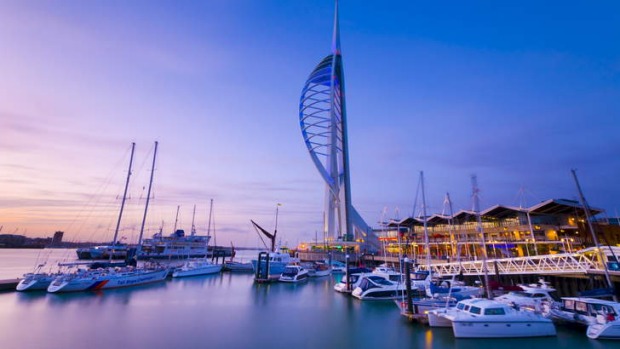
This island city has an extraordinary history as a naval port, writes Steve McKenna.
Connected to the "mainland" by bridge, off England's (at times) gloriously sunny south coast, Britain's only island city is a 90-minute train ride from London. Fittingly, however, for a place with such a rich maritime heritage, many visitors arrive by sea.
Granted its Royal Charter by King Richard the Lionheart in AD1194, Portsmouth is the home of the British Royal Navy, and a vibrant passenger port that welcomes ferries and cruise ships from France, Spain and beyond.
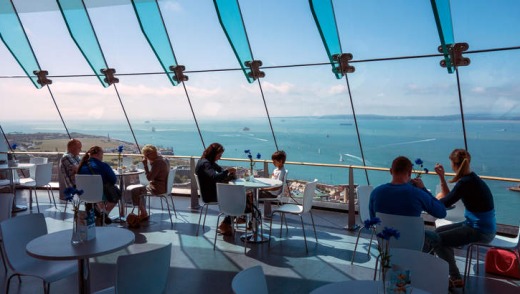
Recently rebranded "the Great Waterfront City", Portsmouth is more affectionately known as Pompey. Theories abound as to why, with many revolving around the antics of drunken sailors. Pompey, it is said, is a slurred pronunciation of Portsmouth Point - a tavern-packed part of the city long popular with thirsty seamen.
10AM
Make a beeline for the icon of 21st-century Portsmouth: the gleaming white Spinnaker Tower, which soars 170 metres above the city's historic harbour and resembles a ship's sail fluttering in the wind. On a clear day, the Spinnaker's lofty observation platforms, accessible via a high-speed elevator, afford stunning views of Pompey's quintessentially English countryside surrounds. Most eyes, though, are almost magnetically drawn to the Solent. One of Europe's busiest waterways, this portal into the English Channel has carried scores of famous vessels down the years, including the battleships that helped defeat Napoleon and Hitler, the First Fleet (which set sail from Portsmouth for Sydney in 1787), and HMS Investigator, which was commanded by Matthew Flinders, on his quest to circumnavigate Terra Australis early in the 19th century.
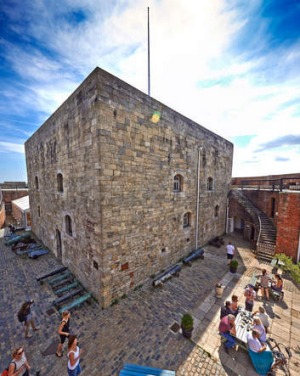
These days, the Solent is peppered with yachts, ferries and hovercrafts zipping to and from the Isle of Wight (which lies 8 kilometres off Pompey).
Missed breakfast? The Spinnaker's Cafe in the Clouds should sort you out.
11AM
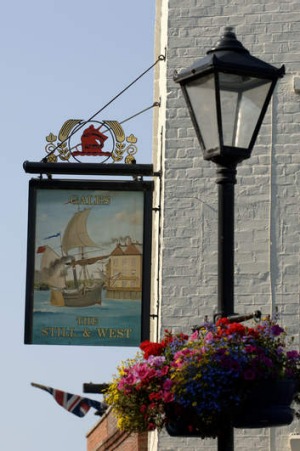
The Portsmouth Historic Dockyard is packed with family-friendly attractions and, as it is a working naval base, you will rub shoulders with serving sailors as you explore. The boat-shaped Mary Rose Museum is the dockyard's newest crowd-puller, hosting what was King Henry VIII's flagship, which sank in the Solent during a scrap with the French in 1545. After 437 years under water, the remains were dredged up in 1982 and, following a £35 million restoration completed last year, its ghostly half-hull is flaunted alongside a hoard of Tudor artefacts recovered from the seabed. There are weapons, tools, ceramics, shoes and pewter ware - plus skeletons of a man and a dog (more than 500 sailors perished).
Leading British historian and museum ambassador David Starkey says: "The Mary Rose is the English Pompeii, preserved by water, not fire. All Tudor life is there; it is like stepping inside a Holbein painting."
Audio-visual displays attempt to convey life aboard the Mary Rose, with digital recreations of crew members generated through forensic research.
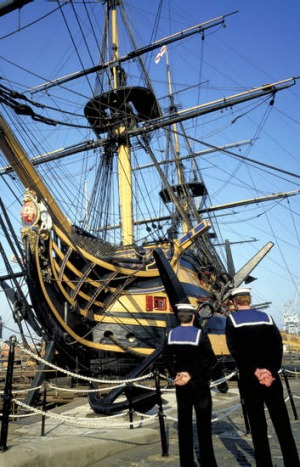
A long-time dockyard favourite, HMS Victory is the ship upon which Lord Horatio Nelson died after helping Britain vanquish France in the 1805 Battle of Trafalgar. Head up Victory's gangplanks and you can roam the atmospheric, lantern-lit gun decks and living quarters of this remarkably well-preserved ship. Kids love it.
Don't miss the dockyard's Royal Navy Museum, which reveals more about navy life and history. Fiddle with hands-on goodies, such as the 74-gun ship - a computer game that lets you sail a warship into battle - and learn interesting nuggets, like the weekly rations of a typical Victorian sailor: oatmeal, cheese, salted pork, dried peas and 56 pints of beer.
1PM
The dockyard's converted warehouses and boathouses offer all sorts of lunch-tastic refreshments (including Georgian-style tearooms). A thriving leisure-retail development hedging the Spinnaker Tower on what was formerly HMS Vernon, Gunwharf Quays, is jammed with places in which to eat, drink and be merry (many of the chain variety).
For more antiquated character, skip past the Quays' vintage boat figureheads, battleship shells and cannons for a pit stop in Old Portsmouth. Back in the day, its cobbled streets thronged with raffish boozers and brothels, attracting scurvy-riddled sea dogs, cut-throat thieves and vagabonds. It is more civilised now, especially on The Point (once known as Spice Island because of its involvement in the Caribbean spice trade).
On a warm day, the outdoor terrace of the Still & West - established in the 1700s - is a lovely spot. Gaze at the ships drifting in and out of the harbour and enjoy beer-battered cod and chips (or perhaps a poached smoked haddock), with a selection of real ales and ciders. If the weather turns nasty, nip inside and cosy up by the pub's log fire.
2PM
Post-lunch, wander the seafront promenade to Southsea, one of Portsmouth's most desirable districts. Pause at Southsea Castle (from whose ramparts Henry VIII glimpsed his beloved Mary Rose sink into the Solent) and the D-Day Museum, which focuses on Operation Overlord, the Allied mission to invade Nazi-held Normandy.
Its centrepiece is the Overlord Embroidery, a Bayeux Tapestry-esque textile that pays tribute to the troops who set sail from Portsmouth, and other south-coast ports, on June 6, 1944.
Pompey is marking the 70th anniversary of D-Day with a calendar of events, including concerts, remembrance services and meet-and-greet sessions with veterans.
3PM
Away from Southsea's pebbly beaches and leafy green commons, you will find eclectic streets lined with cosmopolitan eateries, trendy cafes and quirky boutiques. A symbol of Southsea's independent spirit, Pie & Vinyl (61 Castle Road) is a popular record store and cafe that sells both music and the traditional British dish of pie and mash.
On your Southsea strolls, you might spot the odd plaque etched with a notable name. Scottish-born Sir Arthur Conan Doyle penned the first Sherlock Holmes novels while working as a GP here. Rudyard Kipling spent much of his early childhood in the neighbourhood, having been sent to England from India by his parents, and H. G. Wells was an apprentice at a local drapery emporium.
4.30PM
Portsmouth's most revered literary son, however, is Charles Dickens. His father, John, a navy pay office clerk, moved to Portsmouth during the Napoleonic Wars, and Charles was born in a tiny Regency-era house in 1812. Now home to a museum dedicated to the author (393 Old Commercial Road), it is fitted out with period furniture, including the couch on which Dickens died in Kent in 1870, and walls are decorated with caricatures of his famous fictional characters.
Although Dickens stipulated there should be no memorial to him - apart from his published works - a photogenic life-sized bronze statue of the great man was unveiled in Portsmouth's Guildhall Square in February (on what would have been his 202nd birthday).
6PM
Heavily bombed during World War II, central Portsmouth lacks eye-catching architecture, but there are a few exceptions. A black-and-white Tudor-esque affair shelters the White Swan, a gastro pub close to Guildhall Square. Its craft beer menu features The Inspector, a nutty brown ale dedicated to another legendary Portsmouthian, Peter Sellers. Inspector Clouseau in the Pink Panther films, Sellers was born in Southsea in 1925.
With reliable pub-grub options, as well as pan-fried salmon and pork belly, the Swan is a decent spot for dinner, but if it is fine dining you are after, or, indeed, some tantalising multi-cultural fare, head to Southsea.
Restaurant 27 (27 South Parade) and Montparnasse (103 Palmerston Road) vie for the unofficial title of Pompey's best restaurant, their dishes sporting locally sourced seasonal ingredients, and a fusion of Anglo, Asian and European influences.
Up for a nightcap or two? Southsea's Albert Road, plus Gunwharf Quays and Old Portsmouth, are sprinkled with pubs, cocktail joints and wine bars.
For live entertainment, the Cellars (56 Cromwell Road) has been called "the biggest small venue in the south". With a capacity of just 140, it is an intimate spot for live music and comedy, and attracts a mix of well-known and up-and-coming names. Mumford & Sons, Jimmy Carr and 1980s pop idol Nik Kershaw have all appeared there.
The writer was a guest of Visit Portsmouth, visitportsmouth.co.uk.